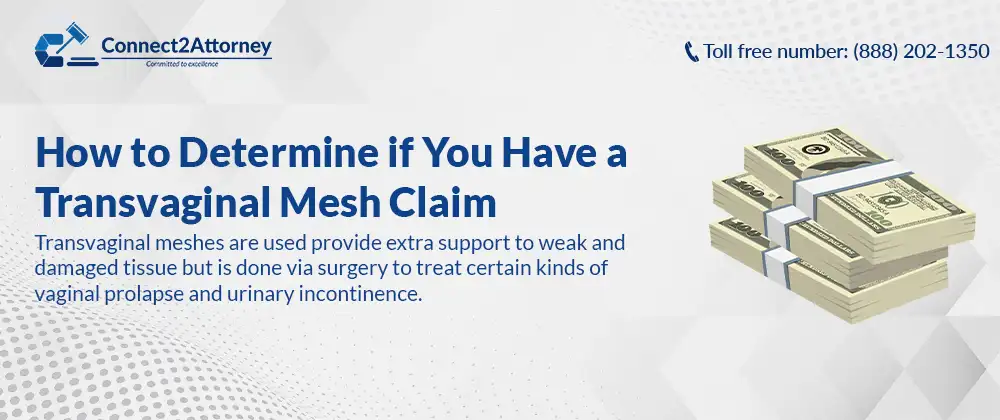How to Determine if You Have a Transvaginal Mesh Claim

How to Determine if You Have a Transvaginal Mesh Claim
Transvaginal meshes are used provide extra support to weak and damaged tissue but is done via surgery to treat certain kinds of vaginal prolapse and urinary incontinence.
NHS Mesh Complications
Although, transvaginal meshes are a solution to your weak and damaged tissue but there are women who have experience complications after mesh implants like pain and discomfort. The most common complication that women have experienced after the surgery are erosion (the tissue that covers the mesh wears away), infections or contract, tightening of the tissue that increases strictures.
Gynae Mesh Problems
For women who have had implanted their mesh through transvaginal mesh to treat vaginal prolapse have faced complications. Mesh complications can lead to injuries like bladder control problems, bleeding, discharge, pain while intercourse, chronic pelvic pain, fistulas and recurring urinary tract infections among others.
In fact, the Food and Drug Administration (FDA) in 2019 banned the sale of transvaginal mesh that is used to repair the pelvic prolapse.
Transvaginal Mesh lawsuit guarantees
Thousands of transvaginal mesh lawsuits have been filed in the wake of the US Food and Drug Administration (US FDA) first warning of serious complications associated with them. The first warnings were issued in 2008 after which in July 2011 the drug regulator issued a safety warning that said circumstances had changed and that serious complications were now considered to be “not rare.”
Maximum of the vaginal mesh lawsuits have been compiled into seven federal multidistrict litigation cases against the leading manufacturers and many if the cases have been resolved. As a result of which, the companies have to pay hundreds of millions of dollars. Other settlements include one that ended 20,000 cases for $830 million, as well as several multi-state settlements not brought in federal court.
There are opportunities for a new vaginal mesh lawsuit for those who have suffered injuries.
Transvaginal Mesh lawsuit scams
The mesh lawsuits have accused companies of a variety of misconduct, which includes negligence, design and manufacturing defects, warranty breaches and deceptive marketing including the way the surgical meshes were promoted to the public. The meshes sometimes eroded or became misplaced and protruded. That includes pain during sex, bleeding and other complications. In few cases, women contracted infections. A report in the World Journal of Urology, a woman who died of sepsis attributed to recurrent urinary tract infections.
Transvaginal Mesh lawsuit benefits
The juries have delivered numerous verdicts against transvaginal mesh manufacturers during the past decade and plaintiffs have received millions of dollars in compensation for medical bills, emotional damages and injuries. They received the compensation after fighting their cases in court.
Certain examples of settlements
Transvaginal mesh makers have settled thousands of legal claims and few of such claims include
- Payment of $188.7 million: Boston Scientific Corp. agreed to pay the amount in 2021 to settle claims from 47 states and Washington, D.C. that it deceptively marketed the surgical mesh devices.
- Payment of $116.9 million: Ethicon, a part of Johnson & Johnson, reached a settlement of the amount in 2019.
- Payment of $60 million: C.R. Bard agreed to pay the amount in 2020 to settle deceptive marketing claims related to vaginal meshes
- Payment of $830 million: Endo International Plc, part of American Medical Systems, agreed to pay $830 million in 2014.
Alternatives To Mesh
There are many treatment options available for women with pelvic organ prolapse and stress urinary continence as alternatives to mesh. Some of the surgical and non-surgical therapies are:
- Pelvic floor physiotherapy: This is a non-surgical treatment in which the pelvic floor is strengthened through actively tightening and lifting the muscles at intervals.
- Bladder training and medication
- Vaginal pessary: This is also a non-surgical treatment where a ring-like device that sits in the vagina and helps the pelvic organ to reduce descent and/or stress urinary incontinence.
- Lifestyle changes, which includes reduction of weight, avoiding lifting of heavy weight, chronic coughing and treatment of constipation.
- Native tissue repair: This is a surgical treatment in which the patient’s own tissue is used to repair the prolapse
- Biological graft repair: This is also a surgical process, where graft from a source is used, such as human or animal tissue, to support the vaginal prolapse
- Pubovaginal sling: A surgical process under which the patient’s own tissue is used.








